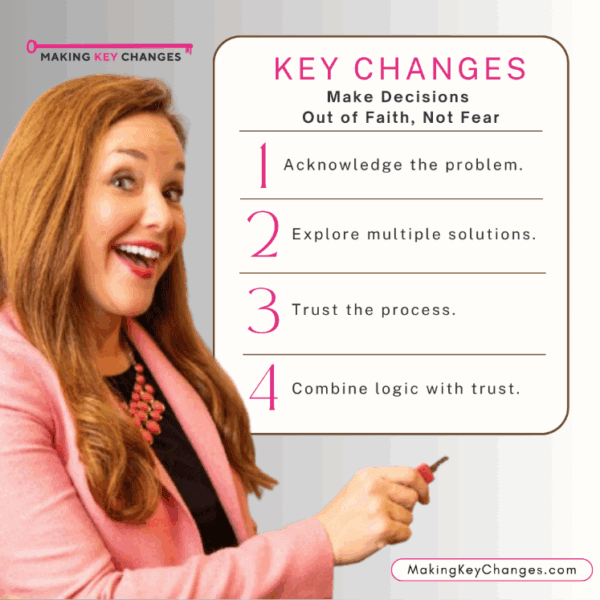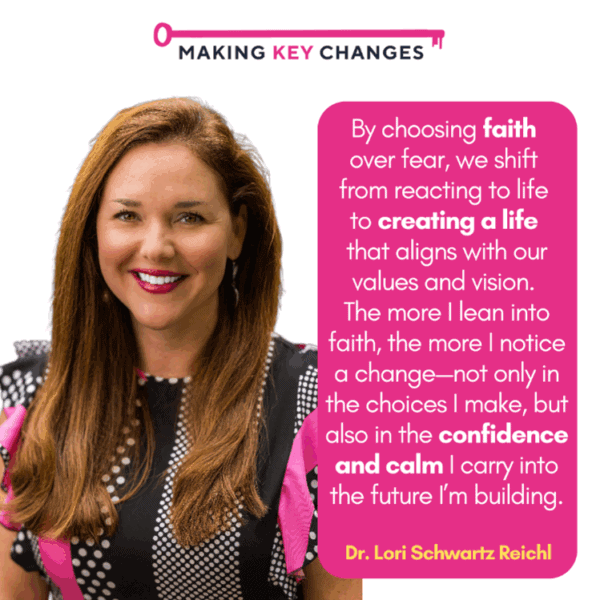/ News Posts / Make Decisions Out of Faith, Not Fear
Make Decisions Out of Faith, Not Fear
By NAfME Member Lori Schwartz Reichl
“Faith is taking the first step even when you don’t see the whole staircase.”—Martin Luther King, Jr.
In a recent MAKING KEY CHANGES podcast episode, #86 Acknowledge Your Capacity and Eliminate Apologies, we discussed the importance of acknowledging our capacity and letting go of unnecessary apologies. Doing so encourages self-awareness, assertiveness, and mindfulness—which lead to a life with more confidence, presence, and joy. We also touched on trusting that the future holds new opportunities.
Besides producing the MAKING KEY CHANGES weekly podcast, I also write a monthly article and a weekly newsletter. I’ve also been subscribing to a few newsletters myself, as I often learn something new from them.
In one newsletter, author Jon Acuff suggested this: Make decisions out of faith, not fear. I get Jon. We’re about the same age, we do similar work, and his kids are about ten years older than mine. Plus, he talks a lot about music, which always catches my attention. That makes me even more curious about his experiences, because he’s already been through stages of life that I’m just stepping into—or hoping to expand.
Jon’s line—make decisions out of faith, not fear—really stopped me and got me thinking.
When I was younger, decisions—especially about change or money—were really tough for me. Honestly, sometimes they still are. I’d avoid making the choice, and that only brought on more emotion—crying, sadness, irritability. Deep down, I usually knew what I wanted or needed to do, but I didn’t have the faith to go through with it. Fear kept me stuck.
Now, I know better and make decisions more quickly and with greater clarity. I also know that many people hear the word faith and immediately think of religion or spirituality. But the secular definition of faith is simply complete trust or confidence in someone or something.
So let me ask you: Whom do you trust? And what lessons have they taught you?
Applying an Engineer’s Mindset
For me, I trust my husband. He’s a stand-up human being—hardworking, humble, and full of integrity. He’s also an engineer, which means he applies logic to almost everything: raising our children, making health decisions, handling money, coaching athletes, teaching graduate students, or managing house projects.
Engineers see challenges not as barriers, but as puzzles to solve. They rely on data, patterns, and systems to bring clarity. They troubleshoot when things go wrong, and they refine their designs until they work. Most importantly, they don’t expect perfection on the first try. They expect iteration—trial and error, learning as they go.
That’s my husband to a tee. We even joke that he’s like Sheldon from The Big Bang Theory. His exercise routine, his work routine, his nighttime routine—they’ve been consistent for decades. And when it comes to decisions—whether about career, food, travel, medical care, home repairs, or anything really—he stays calm and steady.
He’s taught me a lot about life. And although I should say and show it more often, I’m thankful for him every day.
Key Changes for Improved Decision-Making
If we approached our own lives with an engineer’s mindset, we might consider applying these key changes when it comes to decision-making:
- Key Change #1: Acknowledge the problem honestly, instead of avoiding it.
- Key Change #2: Explore multiple solutions, instead of getting stuck on just one.
- Key Change #3: Trust the process, knowing that progress is built step by step.
- Key Change #4: Combine logic with trust—accepting we can’t control every variable, but believing we can adapt along the way.
These same principles apply beautifully in the music classroom, where we help students develop not only musical skills but also confidence and resilience.
Helping Students Make Decisions Out of Faith, Not Fear
As music educators, we are often tasked with guiding our students through pivotal moments in their musical journeys. Whether they’re deciding which instrument to play or voice part to sing, selecting which repertoire to attempt, considering whether to audition for an ensemble, or navigating a difficult musical passage or performance, these decisions can feel daunting—especially when fear and self-doubt creep in.
As educators, we have the privilege of shaping not just musicians, but confident, thoughtful decision-makers. As their teachers, it’s our responsibility to help them approach these moments with faith instead of fear—to believe in their growth, abilities, and opportunities, and to encourage them to carry that same belief in themselves.
In the classroom or rehearsal space, it’s easy for students to become paralyzed by the fear of making mistakes, not being “good enough,” or falling short of expectations. But just like in engineering, where problems are seen as puzzles to solve, every challenge in music is an opportunity for learning. Mistakes aren’t failures—they’re part of the process of becoming a better musician.
As teachers, we play a key role in fostering a mindset of faith over fear. We can guide students to make decisions based on trust in themselves and their development, rather than being overwhelmed by fear of potential failure. We can also share our own experiences—times when we’ve had to choose faith over fear—and model what that looks like in real time.
Cultivating Confidence and Calm
Just as engineers build bridges, buildings, and systems (or in my husband’s case, power supplies for radar systems), we can build resilience, relationships, and habits that serve us well.
When we make decisions rooted in faith, not fear, whether in music, work, or life, we permit ourselves to design a future that’s both intentional and hopeful. Fear often keeps us stuck—hesitant to take risks or to release what no longer serves us. Faith, on the other hand, allows us to trust the process, believe in our resilience, and remain open to opportunities we might not yet recognize.
By choosing faith over fear, we shift from reacting to life to creating a life that aligns with our values and vision. The more I lean into faith, the more I notice a change—not only in the choices I make, but also in the confidence and calm I carry into the future I’m building.
So here’s my challenge to you: The next time you face a decision, pause and ask yourself—or encourage your students to do the same—am I choosing from faith, or from fear?
🎧 Listen to episode #87 Make Decisions Out of Faith, Not Fear of the MAKING KEY CHANGES weekly podcast, for more insights.
📩 To explore how this work can support your school or organization, visit: MakingKeyChanges.com
Photo at top by Vladislav Babienko on Unsplash
About the author:
NAfME member Dr. Lori Schwartz Reichl is the visionary behind Making Key Changes, LLC, a platform devoted to mentorship and motivation. A former public school music educator (2001–2016), Lori transformed classrooms through leadership and creativity—principles she now shares globally as an author, podcaster, speaker, and consultant.
She has designed and delivered hundreds of keynotes and professional learning sessions in more than half of the states in the nation and has guest-conducted over 50 honor bands. Lori teaches two graduate courses developed from her experience, and her Making Key Changes podcast and newsletter offer weekly, actionable insights for growth. Her monthly articles for the National Association for Music Education consistently rank among the most accessed nationwide. In 2025, she launched The Confidence Camp—a unique, week-long experience that helps children discover their voice, believe in themselves, and uplift others.
Rooted in a career of transformation, Lori helps individuals, teams, and organizations create meaningful change. Having overcome challenges in her own journey, she is passionate about helping others refine habits, focus passions, and unlock potential—in collaboration with those they love, serve, and lead.
Learn more about Dr. Lori Schwartz Reichl at MakingKeyChanges.com. Subscribe to her Making Key Changes weekly newsletter and listen to her weekly podcast.
Did this blog spur new ideas for your music program? Share them on Connect! Interested in reprinting this article? Please review the reprint guidelines.
The National Association for Music Education (NAfME) provides a number of forums for the sharing of information and opinion, including blogs and postings on our website, articles and columns in our magazines and journals, and postings to our Connect member portal. Unless specifically noted, the views expressed in these media do not necessarily represent the policy or views of the Association, its officers, or its employees.
Published Date
November 11, 2025
Category
- Careers
- Social Emotional Learning
- Teacher Self Care
Copyright
November 11, 2025. © National Association for Music Education (NAfME.org)








